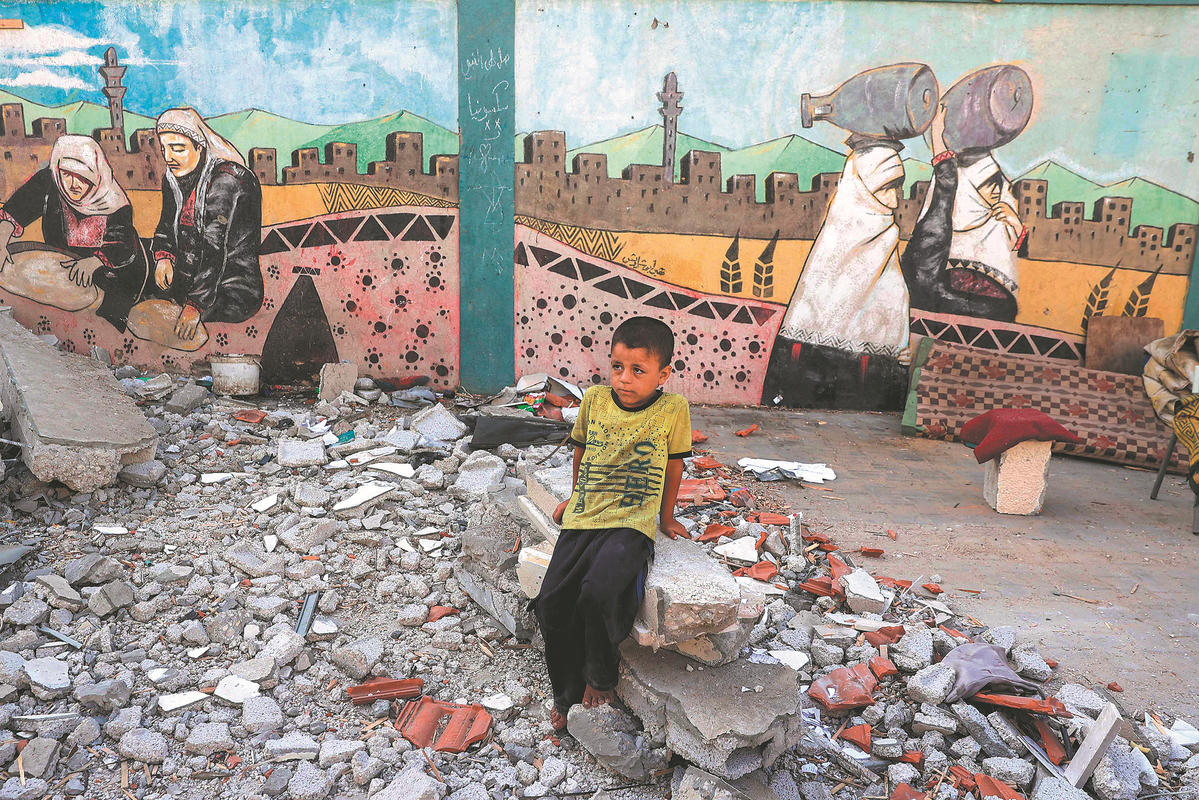Famine threat looms over Gaza, UN warns
Independent experts slam 'starvation campaign' as Israel denies accusations


A group of independent experts and special rapporteurs of the United Nations have said famine was now gripping the Gaza Strip as children die from malnutrition amid Israel's alleged starvation campaign as bombings of schools continued.
"We declare that Israel's intentional and targeted starvation campaign against the Palestinian people is a form of genocidal violence and has resulted in famine across all of Gaza. We call upon the international community to prioritize the delivery of humanitarian aid by land by any means necessary, end Israel's siege, and establish a cease-fire," said experts for the UN Human Rights Council in Geneva in a statement on Tuesday.
Israel's mission to the UN in Geneva slammed the famine statement, saying the UN experts were as much accustomed to spreading "misinformation" as they were to supporting "Hamas propaganda", the Times of Israel reported.
Israel's Coordination of Government Activities in the Territories, or COGAT, which implements the government's civilian policy within the territories of Judea and Samaria, and the Gaza Strip, posted on its X account on Monday that they were committed to collaborating closely with international partners to meet urgent humanitarian needs of civilians "despite our war with Hamas".
The independent experts highlighted the deaths of Fayez Ataya, who was barely 6 months old when he died on May 30, and 13-year-old Abdulqader al-Serhi, who died at the Al-Aqsa Hospital in Deir al-Balah on June 1. These were followed by the death of Ahmad Abu Reida, 9, on June 3 in the tent sheltering his displaced family in Al-Mawasi, Khan Younis.
All three died from malnutrition and lack of access to adequate healthcare. With the deaths of these children from starvation despite medical treatment in central Gaza, there is "no doubt that famine has spread from northern Gaza into central and southern Gaza", the experts said.
Further, they noted that the death of a child from malnutrition and dehydration indicated that the health and social structures "have critically weakened".
Al Jazeera reported on Wednesday that at least 30 Palestinians were killed in Gaza after Israel struck a school housing civilians in Khan Younis. The report noted it was the fourth attack on schools in as many days and following Israel's most recent mass evacuation orders for parts of Khan Younis and Gaza City. The Israeli military said Hamas militants were operating from within the schools, which Hamas denied.
Acute malnutrition
The UN Relief and Works Agency for Palestine Refugees on June 15 had earlier said that more than 50,000 children require treatment for acute malnutrition.
The Integrated Food Security Phase Classification's acute food insecurity analysis conducted in December 2023 had warned of a risk that famine may occur by the end of May 2024, affecting an estimated 1.11 million people.
It noted in its latest report on June 25 that the amount of food deliveries and nutrition services provided to the northern governorates increased, temporarily alleviating conditions there. In this context, the report said, available evidence does not indicate that famine is currently occurring.
But it said a high risk of famine persists across the entire Gaza Strip "as long as the conflict continues and humanitarian access is restricted". It said about 96 percent of the population in the Gaza Strip, or 2.15 million people, face high levels of acute food insecurity through September 2024.
"While the whole territory is classified in Emergency (IPC Phase 4), over 495,000 people (22 percent of the population) are still facing catastrophic levels of acute food insecurity (IPC Phase 5)," the report said.
Maysa Saleh, the Norwegian Refugee Council's Education Officer in Deir al-Balah, Gaza, in her update on Monday said that food remains "the number one worry".
She noted that only last week, there were no vegetables on the market besides some aubergines, tomatoes and onions. Tinned food was diminishing in both quality and quantity.
European Union foreign policy chief Josep Borrell said on his X account that it "is imperative to immediately reach a cease-fire to bring respite to hundreds of stranded civilians, free all the hostages, deliver the needed humanitarian aid".
Special rapporteurs, independent experts and working groups are part of what is known as the Special Procedures of the Human Rights Council. Special Procedures experts work on a voluntary basis; they are not UN staff and do not receive a salary for their work. They are independent of any government or organization and serve in their individual capacity.
































